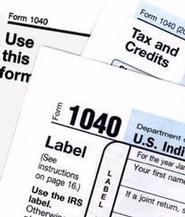
Eleven students in Policy, Poverty and Practice (Econ 235), taught by Lecturer in Economics Margaret Morgan-Davie, are acquiring valuable life skills this semester – skills that they otherwise would not be able to learn in a classroom. Students enrolled in the class are required to participate in the VITA (Volunteer Income Tax Assistance) program, a joint project of the Economics Department and the Arthur Levitt Public Affairs Center. The program offers free tax help to low- and moderate-income (generally $49,000 and below) families who cannot prepare their own tax returns. Through their efforts, these Hamilton students are becoming more aware of their civic duties and increasingly proficient in the language of tax returns.
The VITA program was initiated by the Mohawk Valley Asset Building Coalition (MVABC), the United Way of the Valley, and the IRS as a way to ensure that qualifying taxpayers could receive Earned Income Tax Credits (EITCs), tax refunds designed for low income households. The Levitt Center coordinates with MVABC to enlist college students’ help with the program. Students in Policy, Poverty and Practice have to attend IRS TaxWise training and obtain at least basic-level certification. Thereafter, they complete at least 15 hours of electronic tax filing as a part of their class requirement. This year, students can choose to visit either the Resource Center for Independent Living (RCIL) in Utica or the GPO Federal Credit Union in New Hartford to complete their hours.
Shirin Rashid, empirical research specialist for the Economics department and coordinator of Hamilton’s involvement in the VITA program, said that the program is highly beneficial to students.
“This is an excellent program that gives the students a hands-on experience to examine a policy aimed at addressing inequality,” she said. “It gives them the opportunity not only to gain basic knowledge about income tax preparation but also to get exposure to the wider Utica community and learn about available programs for the underprivileged.”
“I think the best part about the VITA program is that we work with individuals to help claim tax credits that they may not have had an opportunity to claim if they had to pay to have their taxes filed,” said Zachary Harbage ’11, who is enrolled in Morgan-Davie’s class.
Emily Anderson ’13 has been exposed to the complexities of income distribution and welfare programs because of VITA.
“A lot of the people I worked with received refunds, some only a few hundred dollars, some a couple thousand,” she said. “I realized that having kids definitely changes things. People who care for dependents get more welfare money than those who only support themselves or a spouse. Seeing the EITC in practice really made me realize how well it works. However, having customers who were unemployed for an entire tax year proved to me that the EITC only goes so far.”
She also connected to the families affected on a more personal level. “The people were definitely the most interesting part,” she said. “For example, one woman who came in, and was supporting six kids, only made $4000 of taxable income. It really makes you wonder how people get by, or what other sorts of income they may be receiving.”
With only a few weeks left in the tax season, the students can say with pride that they have made a significant contribution to their community. The students attending RCIL have collectively completed 43 tax returns and brought back $81,280 in combined state and federal refunds to the community. Of that amount, $30,553 was EITC dollars.
